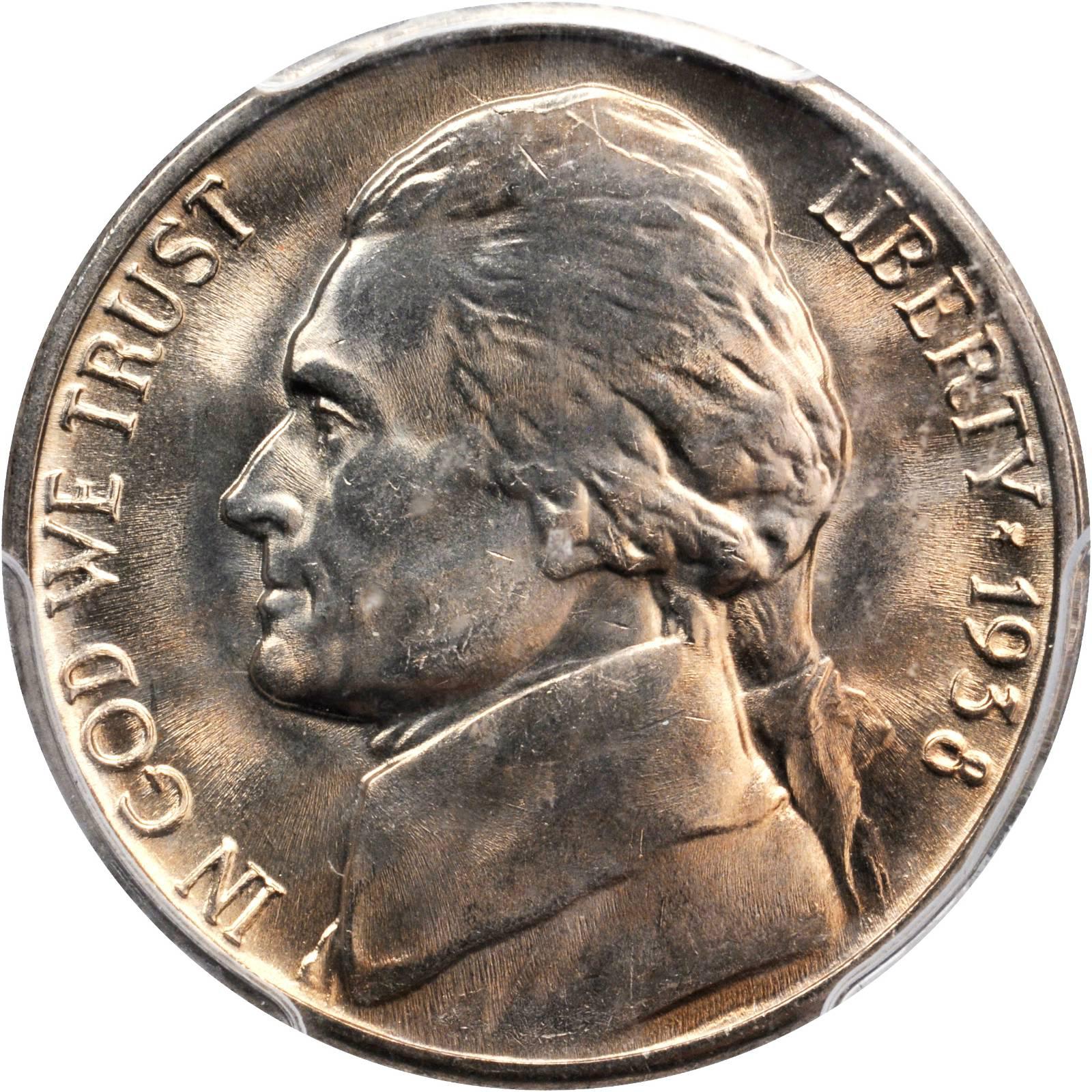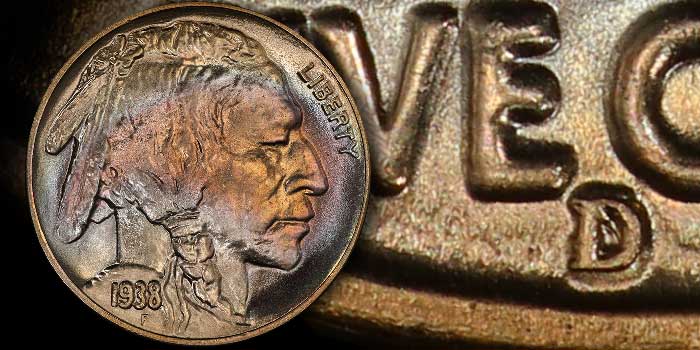1938 Nickel
The Buffalo nickel was the United States five cent coin minted from 1913 to 1938. Its name comes from the buffalo (i.e. American bison) pictured on the reverse design.
USA Coin Book Estimated Value of 1938 Jefferson Nickel is Worth $0.26 in Average Condition and can be Worth $3.14 to $19 or more in Uncirculated (MS+) Mint Condition. Proof Coins can be Worth $134 or more. Click here to Learn How to use Coin Price Charts. Also, click here to Learn About Grading Coins. Dec 02, 2013 1938- JEFFERSON NICKEL Still in production today, the Jefferson Nickel has become a familiar coin to generations of Americans. Introduced in 1938, it is the only one of our current coins being made in its original composition, though this continuity was interrupted briefly by the emergency of World War II. How Much Jefferson Nickels are Worth: Jefferson Nickel Values & Coin Price Chart For Sale 4383 Auctions 3 Wishlist 16 Collection 4567 Pre-War Composition (1938-2003). The Buffalo nickel was the United States five cent coin minted from 1913 to 1938. Its name comes from the buffalo (i.e. American bison) pictured on the reverse design. 1937-S Buffalo nickel. 1938- JEFFERSON NICKEL Still in production today, the Jefferson Nickel has become a familiar coin to generations of Americans. Introduced in 1938, it is the only one of our current coins being made in its original composition, though this continuity was interrupted briefly by the emergency of World War II.
Buffalo nickels are sometimes known as Indian Head nickels due to the composite portrait of an American Indian chief found on the coin's obverse. This iconic design also appears on modern gold bullion coins called American Gold Buffalos. The Gold Buffalo has been issued by the U.S. Mint each year since 2006.
American Gold Buffalo coin, the first .9999 fine gold coin issued by the U.S. Mint annually

Thanks to their recognizable design, Gold Buffalo coins remain popular with both collectors and investors. This is no doubt inspired by the history and symbolism of the Buffalo nickel. Meanwhile, the much more affordable five-cent nickels are among the most avidly collected U.S. coins.
A Note About Valuable Coins
The most valuable coins in a given series are the key dates and varieties. These are the most challenging coins to obtain regardless of their grade.
A 'key date' is usually a coin with a low mintage. Less of them were made in a particular year. This is why collectors will pay more for key date coins.
Varieties are subsets of a given year's issuance of a coin. Something special or out-of-place, such as an error, makes a variety stand out from the rest of the coins produced in that year.
Much like key dates, varieties will have lower production numbers than their common counterparts.
What follows is a list of those pieces for the Buffalo nickel series and what they're worth in well-circulated condition.
1938 Nickel
Current Prices for Buffalo Nickel Key Dates, Semi-Keys, and Varieties (Chart)
| Date | Variety | Price |
|---|---|---|
| 1913-S | Variety I, Mound | $50 |
| 1913-D | Variety II, Line | $125 |
| 1913-S | Variety II | $350 |
| 1914 | 4 Over 3 | $225 |
| 1914-D | n/a | $100 |
| 1915-S | n/a | $60 |
| 1916 | Doubled Die | $3,000 |
| 1918-D | 8 Over 7 | $1,250 |
| 1921-S | n/a | $90 |
| 1935 | Doubled Die Reverse | $50 |
| 1936-D | 3-1/2 Legs | $550 |
| 1937-D | 3-Legged | $575 |
Buffalo nickels that are not included on the list above are more common. They are worth much less in circulated grades.
Circulated Buffalo nickels. Image: CC-BY-SA-4.0 via Wikimedia Commons
Other Buffalo Nickel Values (Chart)
1938 Nickel Indian Head
Here's what the more common Buffalo nickels are worth in well-worn grades.

| Date | Price | Notes |
|---|---|---|
| 1913 | $10 | Variety I |
| 1913-D | $15 | Variety I |
| 1913 | $10 | Variety II |
| 1914 | $20 | n/a |
| 1914-S | $25 | n/a |
| 1915 | $5 | n/a |
| 1915-D | $25 | n/a |
| 1916 | $5.50 | n/a |
| 1916-D | $20 | n/a |
| 1916-S | $12 | n/a |
| 1917 | $7 | n/a |
| 1917-D | $25 | n/a |
| 1917-S | $28 | n/a |
| 1918 | $5.50 | n/a |
| 1918-D | $25 | n/a |
| 1918-S | $20 | n/a |
| 1919 | $2.50 | n/a |
| 1919-D | $20 | n/a |
| 1919-S | $15 | n/a |
| 1920 | $1.50 | n/a |
| 1920-D | $10 | n/a |
| 1920-S | $7 | n/a |
| 1921 | $4 | n/a |
| 1923 | $2.50 | n/a |
| 1923-S | $7.50 | n/a |
| 1924 | $1.50 | n/a |
| 1924-D | $10 | n/a |
| 1924-S | $20 | n/a |
| 1925 | $3 | n/a |
| 1925-D | $12 | n/a |
| 1925-S | $7 | n/a |
| 1926 | $1.50 | n/a |
| 1926-D | $12 | n/a |
| 1926-S | $30 | n/a |
| 1927 | $1.50 | n/a |
| 1927-D | $4 | n/a |
| 1927-S | $2 | n/a |
| 1928–1937-S | $1.25 | Except 1931-S and others listed above |
| 1938-D | $3 | n/a |
| 1938-D | $5.50 | D Over S |
Proof Buffalo Nickel Values (Chart)
Proof coins are made specifically for collectors. They exhibit sharper details, an eye-catching finish, and are made in limited quantities.
The United States Mint made a handful of Buffalo nickels in proof before a 20-year hiatus on producing these specially struck coins.
By the time the U.S. Mint resumed making proof coins in 1936, the Buffalo nickel series was already winding down. In all, there are only seven different proof issues among all Buffalo nickels.
Here's a look at the different proof Buffalo nickels and what they're worth in an average grade of Proof-63:
| Date | Type | Price |
|---|---|---|
| 1913 | Variety I, Proof | $1,350 |
| 1913 | Variety II, Proof | $1,000 |
| 1914 | Proof | $800 |
| 1915 | Proof | $900 |
| 1916 | Proof | $1,200 |
| 1936 | Proof | $1,000 |
| 1937 | Proof | $950 |
All values listed above are for coins in typical condition that are not cleaned, damaged, or otherwise impaired. Pieces that are cleaned or otherwise damaged are worth less than the values listed above.
Buffalo Nickel Series Highlights

Buffalo nickels were struck from 1913 through 1938. They are among the most popular 20th-century United States coins around.
The coin depicts a Native American chief on the obverse and an American bison (or 'buffalo') on the reverse. This five-cent coin is beloved for its classic Old West imagery.
1938 Nickel Price
1913 Type I (Mound) Buffalo nickel. Image: USA CoinBook
Many older numismatists can still recall when Buffaloes made regular appearances in circulation. These beautiful nickels are widely collected by hobbyists of all ages.
In addition to its rugged design by James Earle Fraser, one of the many reasons the Buffalo nickel series has enjoyed timeless appeal is its numerous key dates, semi-keys, and varieties.
Buffalo nickels offer collectors limitless opportunities for numismatic challenges both great and small. Hobbyists of all financial means can assemble a nice set of these classic coins.
Most Buffalo nickels are quite common, and thus they are relatively affordable. Yet there are several rarer pieces that are very valuable. But how much is a Buffalo nickel worth?
Buffalo nickels vary widely in price, from as little as 20 or 30 cents for pieces on which the date has been completely obliterated through heavy wear to thousands of dollars for rarities in Gem Uncirculated condition.
Tips for Collecting Buffalo Nickels
The Buffalo nickel series is expansive to say the least. It encompasses 71 regular-issue nickels along with major varieties and seven proofs.
In circulated condition, only a handful of Buffalo nickels are truly scarce and exorbitantly expensive.
Conversely, the majority of dates are quite pricey in uncirculated condition, particularly in grades of MS-64 or MS-65 or better.
There are many ways that one can build a nice collection of Buffalo nickels.
You can surely assemble an entire date-and-mintmark set of Buffalo nickels. Unfortunately, this is often cost prohibitive for many hobbyists, even if they’re pursuing “just” the circulated pieces.
Let’s examine a few affordable alternatives to building an entire set of Buffalo nickels:
Build a short set. Many collectors narrow down their Buffalo nickel sets to only the most common dates. This includes coins struck between 1934 through 1938.
This significantly reduces the number of coins necessary to complete a set. Oftentimes those who pursue this short set will prefer quality over quantity. That means only going after higher-grade examples.Assemble a year set. A collector may seek one example from each year, regardless of mintmark. This is in lieu of chasing after each date-and-mintmark combination.
You can build a set of Buffalo nickels spanning the entire series run without breaking the bank. A year set can help a collector avoid virtually all of the expensive semi-key and key dates.Focus on only regular-issue business strike coins (not varieties). Finishing a more challenging set complete with varieties and proofs gets very costly. Collectors may find a happy medium by building a regular-issue run of business-strikes.
This would still be a pretty expensive endeavor! But such a set lacks the super-expensive varieties such as the 1916 doubled die and 1937 3-legged nickels.
Most Buffalo nickels only really become collectible when the date is at least partially visible. Basically that translates into an example grading About Good-3 to Good-4.
Many hobbyists prefer that the bison exhibits a full horn. This is usually seen at a grade of Very Fine-20 or higher.
1939 Nickel No Mint Mark
Regardless of the coin's grade, the nicer the piece, the stronger chance it improves in value down the line.
Besides, high-quality coins are simply more desirable than subpar pieces. Numismatists always find more satisfaction with coins boasting high-quality surfaces and overall excellent eye appeal.
Like the modern Gold Buffalo, the Indian Head nickel has inspired many fantastic and artistic items on today's bullion market. In addition to a one-time commemorative Silver Buffalo coin issued by the U.S. Mint in 2001, private refineries across the United States regularly make Silver Buffalo rounds.
Several talented medallic artists (sculptors and engravers) have even taken their inspiration from the American Buffalo theme even further. Some examples are The Hunter silver round and the Silver Buffalo round (antique finish), exclusively available for purchase at Gainesville Coins! See below:

Joshua McMorrow-Hernandez is a journalist, editor, and blogger who has won multiple awards from the Numismatic Literary Guild. He has also authored numerous books, including works profiling the history of the United States Mint and United States coinage.
1938 Jefferson Nickel Value Chart
More related content: